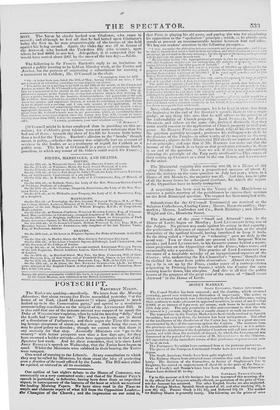Our outline of last night's debate in the House of
Commons, was mocessarily on a very contracted scale; and that of Sir ROBERT PEEL'S -speech in particular, is defective, having been done from an imperfect -report, in consequence of the lateness of the hour at which we received the leading Morning Papers. We have since read in the Times an ample and elaborate report of what fell from the Opposition Leader— the .Chaus,pion of the Church; and the impression on our mind is,
that PEEL is playing his old game, and paving the way for ab:oidoniny his opposition to the " spoliation " principle ; which, as be plainly sees, stands at present an insurmountable barrier between him and office. We beg our readers' attention to the following passages-
.. I may recognize the distinct:0ns between corporate and p6,tte property ; :ma I may be able to discern that what is hell in trust Mr others, 11,11Il What is enitlyed re mu 1r n ads ant age, do not stand in Me same cateyory ; but the danger of discussiu; melt tie...tile's will be precisely the SWIM in each case. • • • "My objection to this ( the Appropriation) principle is, that lot apprimiltieg a tos• ale awl imaginary surplus out ale endangering the seem its of wipes: nu.; encou-
raging delasion among the tithe payers of Ireland." • • •*
Mr. Barron had complained that out or a revenue or 760,0001. an allotment for the purposes of edtwation of 50,0001. as, refused. Could the honourable Member lee that there existed a reveolte of 760,000/.? If he roaid, endit voe:.tio ; and" le (Sir Peil)shoull le perfectly ewaent. • lle had looked through the u bole of this bill, and itt tits epluien the 1110 judicial port if it leas Mat slick t from ON Ten Suet the sone sheet. • • - •
The noble lord upp(-site I tool John Russell) hail justly stated, that bet, eel, Ole
ties s of IWO Conflielillg parties 011 this CilleSI MI the go ‘s1 senw or tio. oph• I.: ug• laud must be the arbiter. In tied hit e•meurrel. It nanAt to the prop's, to determine Whether he 41:1,1 IllOSe With W110111 he wird 11,•re or were net 5s art- anted in refusing to be parties to the bill of the noble !ord. • • Ile ethhed to see an loamt he arrangement qt. Me gnesti,n fj74 cf.• 1; :eel it would be a most ungrateful retinal Mr the Church uf Ireland to make to CI.. p 1::e0a who had ,howo stud, a generous sympathy in her behalf, if her members n; IMie,1 ed less desire to expedite that settletnent.
Now, while reading these passages, let it be kept in view, that from the beginning to the end of Sir ROBERT'S speech, there is Lot a single pledge, or any thing like one, that he will adhere to the principle of the inalienability of Church property. Lord STANLEY, Sir JA NIES GRAHAM, and others on the same side, declared distinctly that they never would consent to the application of Church property to civil pur. poses. Sir ROBEBT PEEL, 011 the other hand, talks of his desire to see the question amicably arranged ; professes his willingness to abide by the decision of the People—in other words, of the majority in the next Parliament ; objects to the Ministerial Bill chiefly on mutters of detail, not on principle • and says that if Mr. BARRON CAB Blake out that the income of the e:hurch is so large as that gentleman estimates it, there ' is an end of the question. Now we ask if this is not substantially throwing the principle of the Tory party overboard ?—This comes of their setting up STANLEY as a rival in the one House, and LYN: teitAtsT in the other.


























 Previous page
Previous page